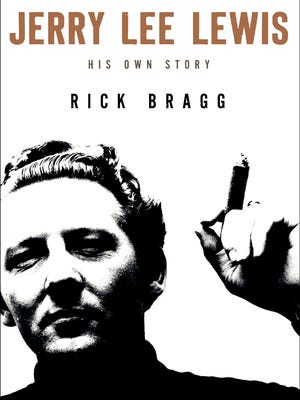Rick Bragg gives Jerry Lee Lewis his say

When you interview Jerry Lee Lewis, you go into it assuming some questions could get you shot.
Rick Bragg braved the gun and Lewis' intimidating reputation to write Jerry Lee Lewis: His Own Story. It's a grand Southern tale about a proud man who once challenged Elvis Presley for the title of King of Rock 'n' Roll with combustive records like Whole Lotta Shakin' Going On! and Great Balls of Fire, then watched his career burn to the ground around him for reasons he never fully understood or accepted.
"I approached him with great anticipation — and one reservation, as to getting shot," the Pulitzer Prize-winning journalist writes in the book's introduction.
Bragg portrays Lewis, 79, as a man with no governor — not on his mouth, not on his actions, not on his desires. Lewis possesses an outsized sense of destiny and no sense of self-preservation, though he has outlived all of his compatriots from his days with Memphis' Sun Records: Presley, Roy Orbison, Carl Perkins, Johnny Cash and Sam Phillips.
His Own Story has the feel of myth, but it has the ring of truth. Bragg depicts the railroad town of Ferriday, La., as a setting worthy of a young pianist with a penchant for self-mythologizing. He introduces an insular clan of Lewises, Swaggarts, Gilleys and Calhouns that loved their music and, often, their liquor and thought nothing of cousin-marrying. And he tells of a rambunctious boy drawn to the records of honky-tonk piano man Moon Mullican and to a chitlin'-circuit nightclub called Haney's where he hid under tables to watch blues giants play.
Bragg gives fresh context to the major incidents and themes of Lewis' life: his marriage to his 13-year-old third cousin Myra Gale Brown; the deaths of two other wives and two sons; his attempts to reconcile his God and his music; and the way his narrative intertwines with Presley's. Bragg unspools the tale at a casual pace, as if a man setting fire to a piano onstage were the most natural thing in the world, if a bit of a marvel.
He's well-stocked with the poetic similes and metaphors expected of a Southern storyteller. Whole Lotta Shakin' is "a tune that had all the subtleties of a dog bite." Lewis is "a tar baby for temptation and a walking catastrophe in the realm of regular people." He interjects Lewis' voice sparingly, to emphasize a point or because he can't bring himself to make a particular claim.
Make no mistake: This is Lewis' version of his story, filtered through Bragg's gift for language and his feel for the South. If Lewis insists a thing happened a certain way, Bragg doesn't try hard to disprove him, though he'll allow that other interpretations of events might exist. So many other people have told Lewis' story — and, in the case of that godawful 1989 Great Balls of Fire! film with Dennis Quaid, badly — he deserves at least that much. His Own Story casts one of rock 'n' roll's outlandish lives in a new light, giving Lewis the voice in words that he always had in the notes that came from the ivory keys.
Jerry Lee Lewis: His Own Story
By Rick Bragg
HarperCollins, 512 pp.
4 stars out of four